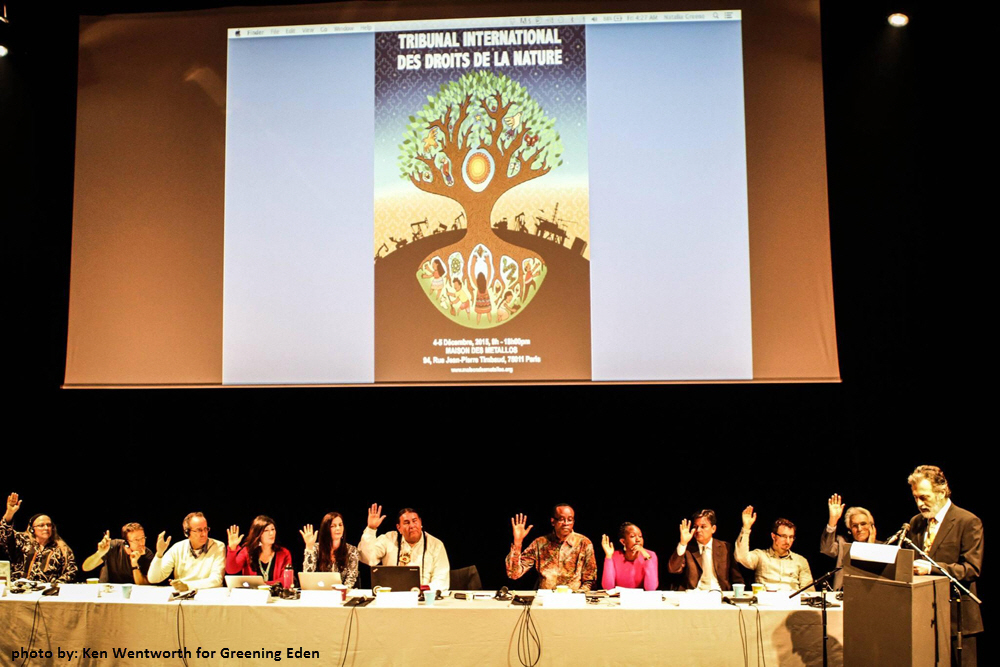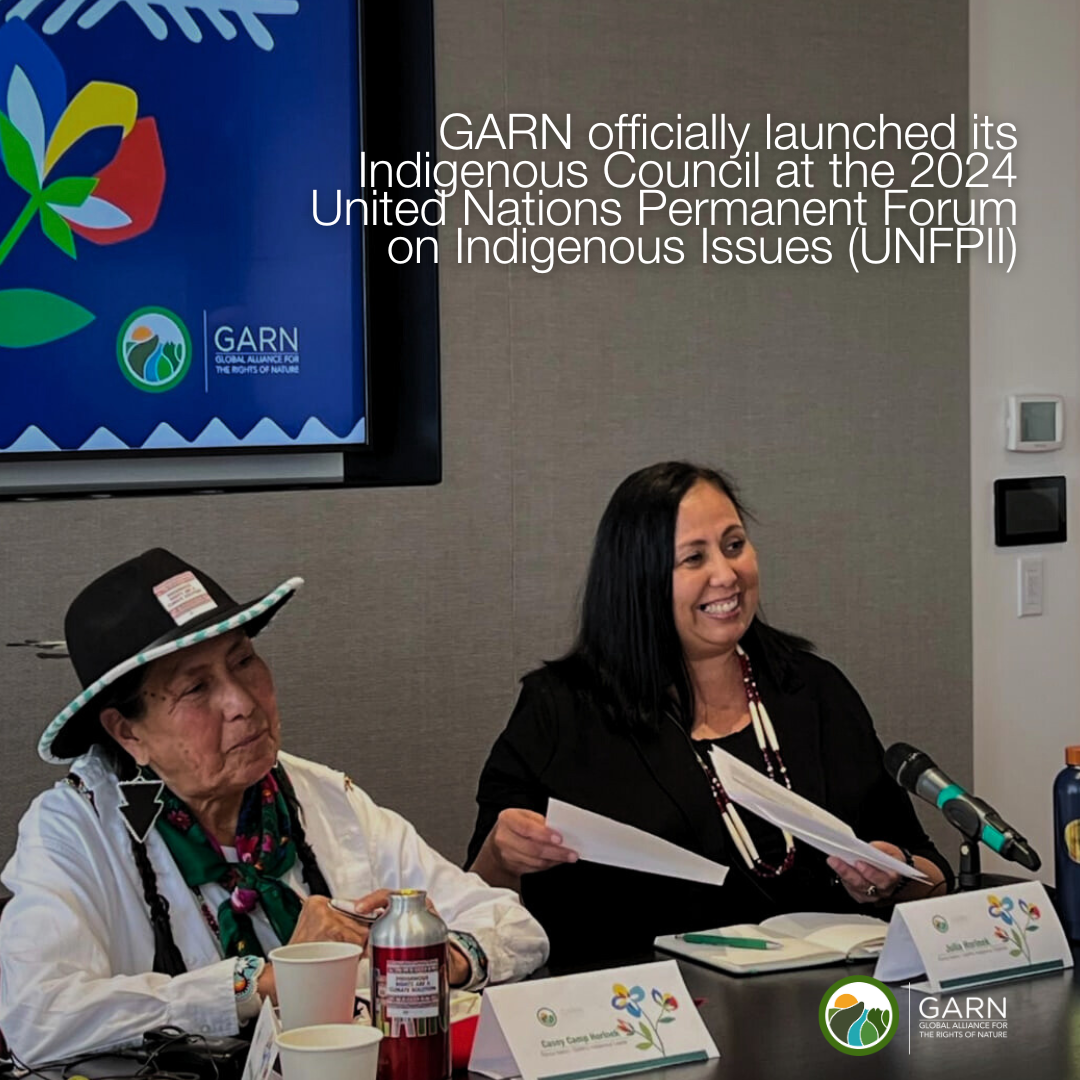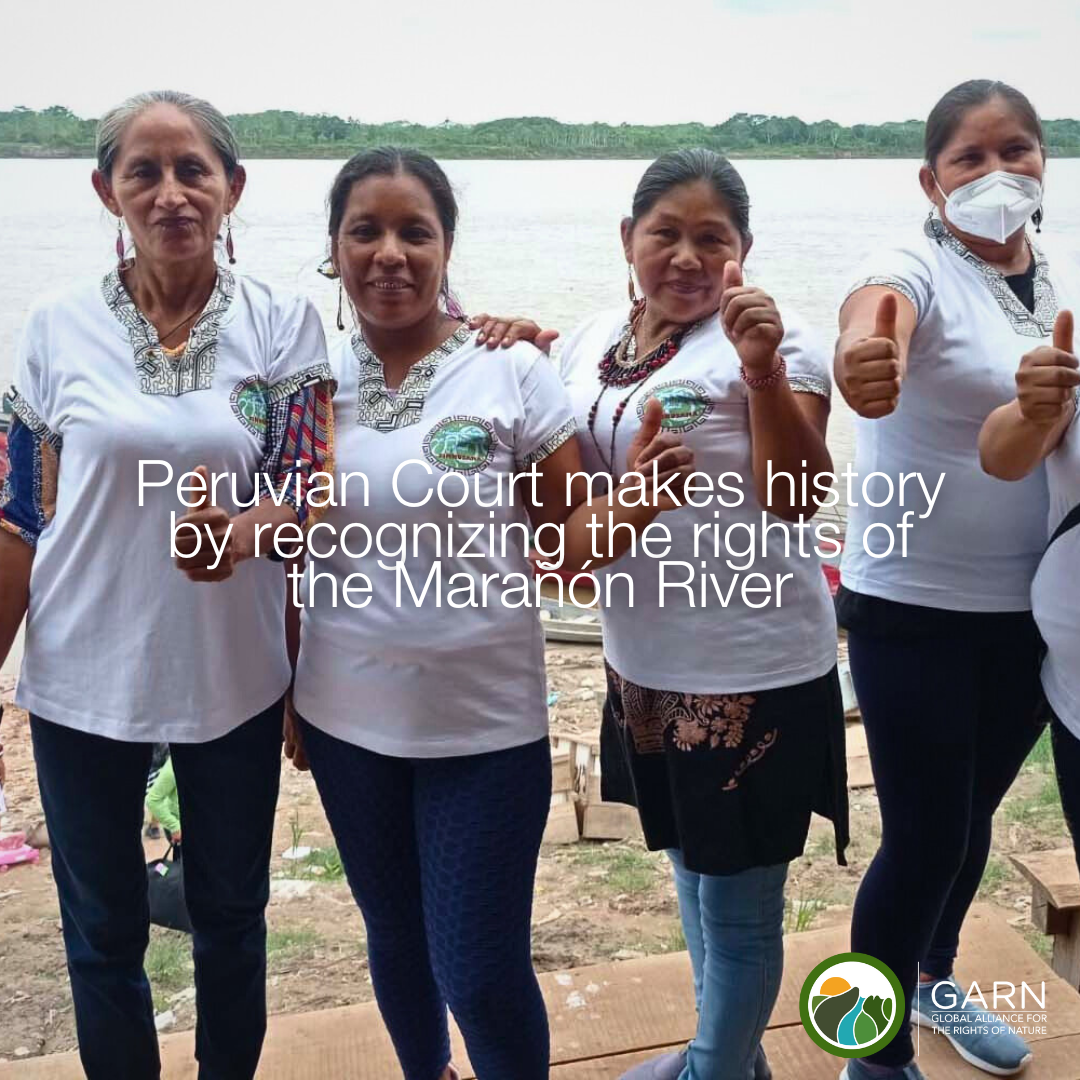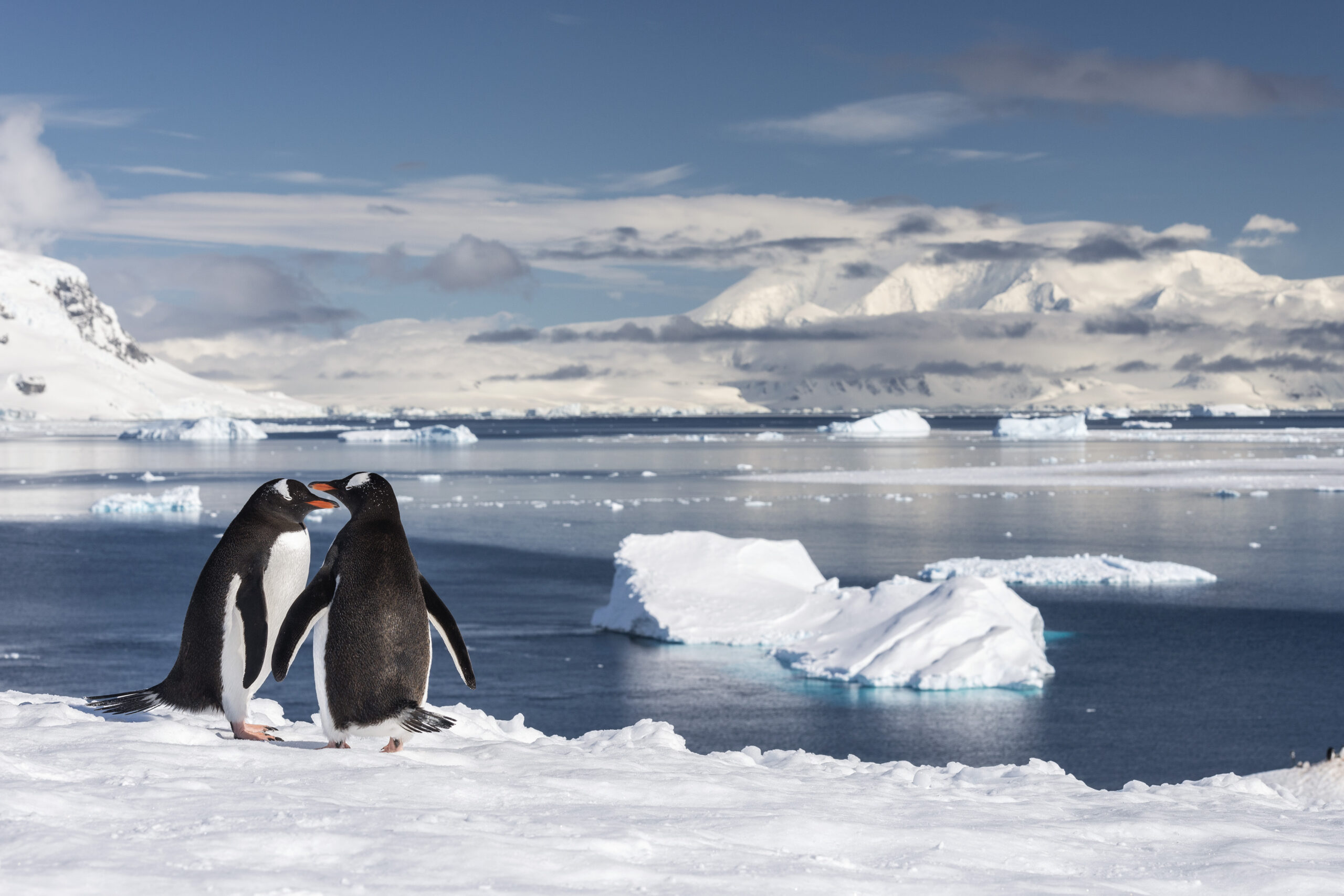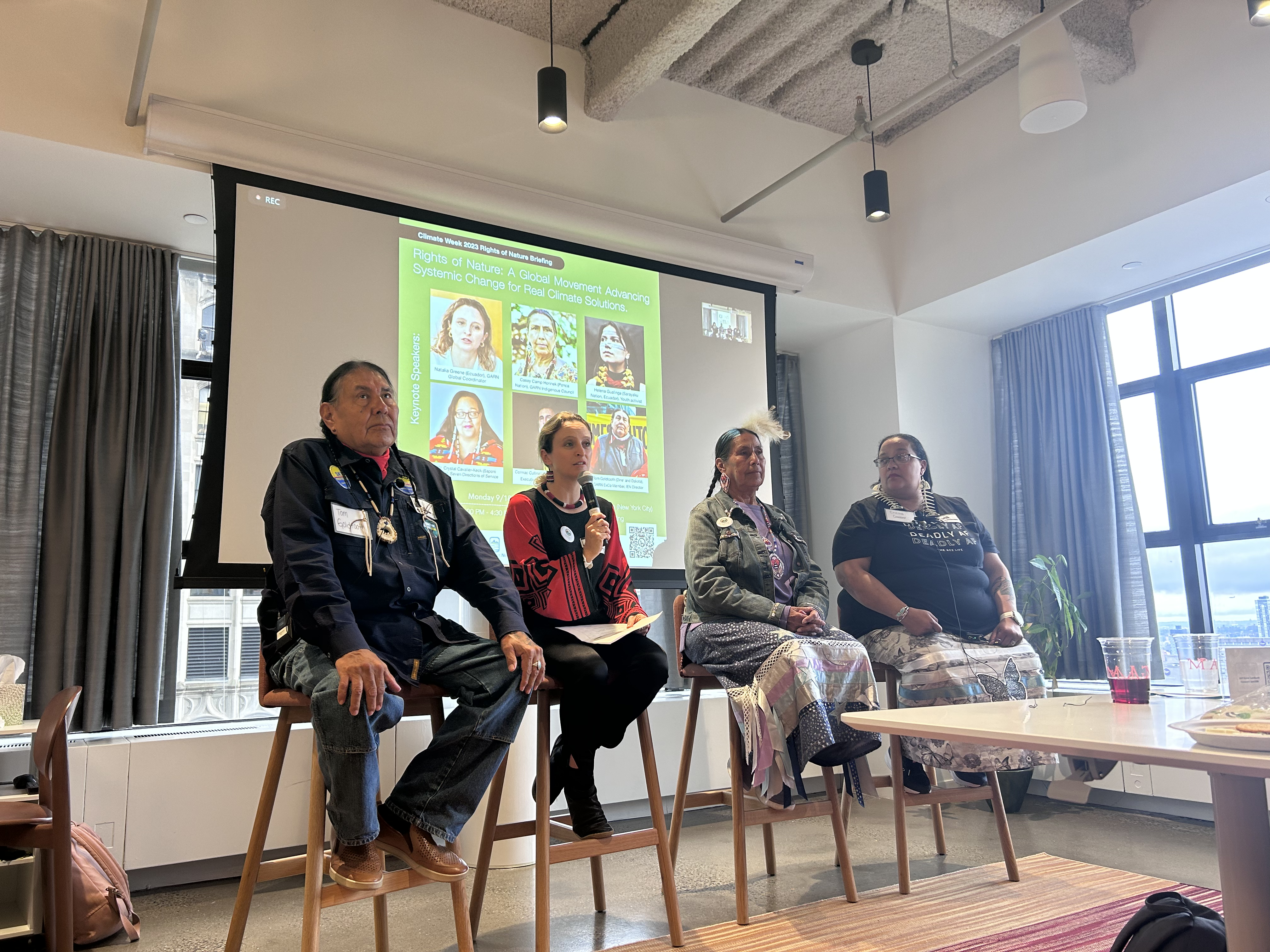International Rights of Nature Tribunal Hears Cases for Mother Earth in Paris
Tribunal Offers Earth-Driven, Not Market-Driven, Solutions to Climate Change
 photo by: Ken Wentworth for Greening Eden
photo by: Ken Wentworth for Greening Eden
 Indigenous peoples from around the world played a leading role throughout the Tribunal as judges, experts and witnesses. One of the highlights was the signing by the legendary Chief Raoni of the Kayapo people of the Brazilian Amazon of the People’s Convention that formally established the Tribunal. The judges of the Tribunal were honored to reciprocate by signing documents confirming their support for the Alliance of Earth’s Guardians established by Chief Raoni and his delegation.
The participants of the Tribunal showed the strong, united leadership so lacking at COP 21 by signing the People’s Convention that formally established the Tribunal which opened the way to the creation of Regional Tribunals throughout the world. The Tribunal bases its judgements primarily on the Universal Declaration for the Rights of Mother Earth and international human rights law, but also recognized ecocide as a crime. The judgements provide clear direction in each case on who is accountable and on what must be done to repair the harm and restore Earth (and communities) to health and well-being. While governments participating in the COP 21 are locked in tortuous negotiations over the wording of an agreement that will worsen the destruction of Mother Earth, the people of the world in this way demonstrated what genuine global collaboration and solidarity can achieve.
The panel of Judges
The following distinguished judges constituted the International Rights of Nature Tribunal in Paris: President – Cormac Cullinan (Global Alliance for the Rights of Nature, and author of Wild Law- South Africa); Tom BK Goldtooth (Indigenous Environmental Network, Turtle Island – USA);
Alberto Acosta (Economist and former president of the Constitutional Assembly – Ecuador); Osprey Orielle Lake (Women’s Earth and Climate Action Network – USA); Terisa Turner (International Oil Working Group, Friends of the Earth – Canada, professor – Canada and USA); Felicio Pontes (Federal Prosecutor – Brazil)
; Damien Short (Director Human Rights Consortium, University of London – UK); Atossa Soltani (Amazon Watch founder – USA);
Nnimmo Bassey (Health of Mother Earth Foundation / Oilwatch – Nigeria);
Ruth Nyambura (African Ecofeminists Collective – Kenya);
Christophe Bonneuil (Historian of Sciences, CNRS, Attac – France);
Philippe Desbrosses (Doctor in Environmental Sciences, Farmer, Intelligence Verte – France); – Honorary Judge on December 4th Dominique Bourg (philosopher and author, University of Lausanne, Switzerland).
Co-Prosecutors Linda Sheehan, Earth Law Center, USA and Ramiro Avila, Universidad Andina Simón Bolivar, (Ecuador) represented Mother Earth. Natalia Greene, Global Alliance for the Rights of Nature (Ecuador) served as Secretariat.
Listening to Nature
The proposed solutions to climate change being presented at COP 21 are abstract, theoretical, market-driven, not Earth-driven, and motivated by self-interest. The approach at the hearings of the Tribunal couldn’t have been more different. Its findings were based scientific and other expert testimony, from the first-hand experiences of witnesses. Decisions drew on scientific knowledge and the cosmovision, worldview and wisdom of indigenous peoples and local communities. The focus was on listening to Nature and was based on the recognition that Nature’s laws cannot be broken – an understanding that appears to be absent from COP 21.
The Tribunal opened and closed with deeply moving evocations of Mother Earth by indigenous peoples. They also presented testimonies that drew the Tribunal’s attention to dimensions ignored in the COP 21 negotiations, including the denial of the sacredness of the Earth, which must be considered along with its physical properties. Central to these dimensions was how patriarchal, dominating mind-sets and world views deny the sacred, and as a consequence, cause the creative feminine principle of Mother Earth to be attacked, resulting in the disruption of vital balances.
Nature is alive, she has the right to exist, to maintain natural cycles, to flourish and to constantly regenerate life. However most legal, economic and political systems treat Nature as an object which cannot have rights – as a slave to be used and exploited. Reverence for Nature is replaced with utilitarian and perverse views of Nature that seek to commodify and commercialize vital natural processes. This results in the climate crisis we and the Earth face today.
Findings of the Tribunal
The Tribunal’s findings are clear and strong – specific in who must be held accountable and why, and in the practical measures that need to be taken to solve the challenges faced by humanity. The Tribunal recognized that solutions do exist – communities and indigenous peoples have been applying these solutions and have been putting their bodies on the line to protect Earth for hundreds of years. We are living in an unequal world and the solutions need to be equitable.
Indigenous peoples from around the world played a leading role throughout the Tribunal as judges, experts and witnesses. One of the highlights was the signing by the legendary Chief Raoni of the Kayapo people of the Brazilian Amazon of the People’s Convention that formally established the Tribunal. The judges of the Tribunal were honored to reciprocate by signing documents confirming their support for the Alliance of Earth’s Guardians established by Chief Raoni and his delegation.
The participants of the Tribunal showed the strong, united leadership so lacking at COP 21 by signing the People’s Convention that formally established the Tribunal which opened the way to the creation of Regional Tribunals throughout the world. The Tribunal bases its judgements primarily on the Universal Declaration for the Rights of Mother Earth and international human rights law, but also recognized ecocide as a crime. The judgements provide clear direction in each case on who is accountable and on what must be done to repair the harm and restore Earth (and communities) to health and well-being. While governments participating in the COP 21 are locked in tortuous negotiations over the wording of an agreement that will worsen the destruction of Mother Earth, the people of the world in this way demonstrated what genuine global collaboration and solidarity can achieve.
The panel of Judges
The following distinguished judges constituted the International Rights of Nature Tribunal in Paris: President – Cormac Cullinan (Global Alliance for the Rights of Nature, and author of Wild Law- South Africa); Tom BK Goldtooth (Indigenous Environmental Network, Turtle Island – USA);
Alberto Acosta (Economist and former president of the Constitutional Assembly – Ecuador); Osprey Orielle Lake (Women’s Earth and Climate Action Network – USA); Terisa Turner (International Oil Working Group, Friends of the Earth – Canada, professor – Canada and USA); Felicio Pontes (Federal Prosecutor – Brazil)
; Damien Short (Director Human Rights Consortium, University of London – UK); Atossa Soltani (Amazon Watch founder – USA);
Nnimmo Bassey (Health of Mother Earth Foundation / Oilwatch – Nigeria);
Ruth Nyambura (African Ecofeminists Collective – Kenya);
Christophe Bonneuil (Historian of Sciences, CNRS, Attac – France);
Philippe Desbrosses (Doctor in Environmental Sciences, Farmer, Intelligence Verte – France); – Honorary Judge on December 4th Dominique Bourg (philosopher and author, University of Lausanne, Switzerland).
Co-Prosecutors Linda Sheehan, Earth Law Center, USA and Ramiro Avila, Universidad Andina Simón Bolivar, (Ecuador) represented Mother Earth. Natalia Greene, Global Alliance for the Rights of Nature (Ecuador) served as Secretariat.
Listening to Nature
The proposed solutions to climate change being presented at COP 21 are abstract, theoretical, market-driven, not Earth-driven, and motivated by self-interest. The approach at the hearings of the Tribunal couldn’t have been more different. Its findings were based scientific and other expert testimony, from the first-hand experiences of witnesses. Decisions drew on scientific knowledge and the cosmovision, worldview and wisdom of indigenous peoples and local communities. The focus was on listening to Nature and was based on the recognition that Nature’s laws cannot be broken – an understanding that appears to be absent from COP 21.
The Tribunal opened and closed with deeply moving evocations of Mother Earth by indigenous peoples. They also presented testimonies that drew the Tribunal’s attention to dimensions ignored in the COP 21 negotiations, including the denial of the sacredness of the Earth, which must be considered along with its physical properties. Central to these dimensions was how patriarchal, dominating mind-sets and world views deny the sacred, and as a consequence, cause the creative feminine principle of Mother Earth to be attacked, resulting in the disruption of vital balances.
Nature is alive, she has the right to exist, to maintain natural cycles, to flourish and to constantly regenerate life. However most legal, economic and political systems treat Nature as an object which cannot have rights – as a slave to be used and exploited. Reverence for Nature is replaced with utilitarian and perverse views of Nature that seek to commodify and commercialize vital natural processes. This results in the climate crisis we and the Earth face today.
Findings of the Tribunal
The Tribunal’s findings are clear and strong – specific in who must be held accountable and why, and in the practical measures that need to be taken to solve the challenges faced by humanity. The Tribunal recognized that solutions do exist – communities and indigenous peoples have been applying these solutions and have been putting their bodies on the line to protect Earth for hundreds of years. We are living in an unequal world and the solutions need to be equitable.
“So the first point is inescapable. This is a systemic issue and the responses must be systemic.
Secondly, if anyone came here with any doubts about whether or not human rights and the rights of nature are compatible, I think that they must have been dispelled. Everybody has demonstrated that they are inseparable. As Chief Seattle is reported to have said so long ago: ‘What befalls the Earth, befalls the children of the Earth.’”
Secondly, if anyone came here with any doubts about whether or not human rights and the rights of nature are compatible, I think that they must have been dispelled. Everybody has demonstrated that they are inseparable. As Chief Seattle is reported to have said so long ago: ‘What befalls the Earth, befalls the children of the Earth.’” Cormac Cullinan The evidence presented at the Tribunal established beyond any doubt that human rights and the rights of Nature are inseparable, and that both are being systematically violated by systems based on arrogant delusions arising from the misconception that humans have the right and ability to dominate and exploit Earth. Evidence presented at the Tribunal also showed how indigenous understandings and knowledge complement scientific knowledge. It also demonstrated the extraordinary creative energies that are released when diverse peoples unite, inspired by a shared love of Earth, to find the solutions that humanity so desperately needs, especially at this moment in time. Cases the Tribunal heard in Paris Climate change Former Bolivian ambassador to the United Nations, Pablo Solón led the presentation of the Climate Change case. The evidence showed why geo-engineering, nuclear energy, industrial and “climate smart” agriculture, biofuels, and the accelerated exploitation of fossil fuels are false solutions devised for corporate profit that will increase the damage to Earth. The Tribunal found that the rights of Nature are being systemically violated by climate change, mainly as a consequence of the acts and inaction of governments and international organizations (including the United Nations), the legal, economic and political systems that they have established, and the activities of a relatively few companies. The Tribunal closed the case and a written judgement will follow. Commercialization of Nature The case of financialization of Nature, presented by Ivonne Yanez was expanded from the previous Tribunals that before dealt only with REDD+ (Reducing Emissions from Deforestation and Forest Degradation). The Tribunal took note of the evidence that many more instances of the commodification and commercialization of Nature are emerging. These include biodiversity offsets, carbon offsets, (so-called) clean development mechanisms, and (so-called) smart agriculture. The Tribunal decided to keep the case open so that more evidence can be collected and presented – particularly with regard to the identity of the perpetrators. Genetically modified organisms Dr. Vandana Shiva led the presentation of this case which deals with genetically modified organisms (GMOs) and the agro-food industry. The Tribunal heard expert evidence from Ronnie Cummins, Marie Monique Robin, Andre Leu and José Bové; all of whom exposed the damage that GMOs and associated pesticides are doing to consumers, to animals and to soil. The Tribunal decided to keep the case open to hear additional evidence especially through regional Tribunals including in Asia. Defenders of Mother Earth Two cases of Defenders of Mother Earth were heard in the Tribunal: (1) the criminalization of Defenders in Ecuador and (2) the persecution of Defenders who protest against the pollution in Houston, Texas arising from fossil fuels and chemical contamination. The judges ratified the principle that the Tribunal would defend the Defenders of Mother Earth and hear further cases where necessary. It condemned the Government of Ecuador’s criminalization of Defenders of Mother Earth in that country, and demanded the restitution of human rights, liberty and the re-opening of closed institutions in Ecuador. The Tribunal closed the Ecuador case but kept the Texas case open in order to gather new evidence. Fracking The Tribunal had already conducted hearings about global fracking at its previous sessions in Quito and Lima. The Tribunal heard evidence from witnesses about the damage that fracking is causing in Argentina. Witnesses testified about how in the USA fracking is “breaking the bones of Mother Earth”, causing earthquakes and widespread suffering of the people who inhabit lands that are being sacrificed to “unconventional oil extraction”. The Tribunal confirmed that fracking results in a range of serious violations of the rights of Nature. After hearing the new evidence presented in Paris, the judges decide to close this case but recognized this is an ongoing threat that should continue to be examined by regional tribunals. Mega dams in Brazil Gert Peter Bruch and Christian Poirier presented the case of mega dams in Brazil, with the powerful testimonies of Antonia Melo, María Lucia Munduruku and Chief Raoni. The Tribunal condemned the building of Belo Monte and Tapajos mega dams and the planned construction of many more, which will cause horrific destruction of the Amazon and its inhabitants. It decided to leave the case open to hear additional evidence in a regional Tribunal in Brazil. New cases accepted for hearing at subsequent sittings of the Tribunal A number of new cases were presented to the Tribunal as probable violations of the Rights of Nature which justified being heard by the Tribunal in the future. The Tribunal accepted them all for further consideration and gave directions about how the cases should be developed. The Corralejas case concerns the cruel killing of bulls in Colombia. The Tribunal found that there was clear evidence of torture and cruelty to animals in violation of the Declaration of the Rights of Mother Earth and asked that the case be widened to include other violation of animal rights for initial consideration by a regional Tribunal. The case of the community of Rosia Montana in Romania which has been threatened by proposed gold mining was accepted with the direction that it be widened to consider other examples of destructive mining practices. The depletion of marine life was accepted with the request that more specific information be presented about the identity of the main perpetrators. The Shell case in Nigeria was accepted and the violence in the area was condemned with the recommendation that consideration be giving to establishing a regional tribunal to conduct hearings. Finally, the case on the oil sands in Canada was accepted and the Tribunal observed that there was evidence that this may be one of the most dangerous instances of ecocide on the planet. Ecocide cases The Tribunal also re-considered two cases that it had previously heard. The objective of the reconsideration was to determine whether in addition to being violations of the Declaration, there was also evidence that the two cases were examples of the international crime of ecocide. (Severe violations of the Rights of Nature may also qualify as ecocides, because they constitute crimes against humans and the planet.) The Tribunal re-examined the Yasuní case (which involves proposed oil exploitation in a national park in the Ecuadorian Amazon) and Chevron case (which involves responsibility for rectifying huge damage to the Amazon caused by Texaco/ Chevron) from the perspective of ecocide. The Tribunal found that the Chevron case was one of the worst instances of ecocide perpetrated on the Amazon and that restorative justice should be applied. In preparing the written judgment, consideration would be given to whether or not Chevron itself should be liquidated and its assets used to restore the damage. It noted that individuals, such as the directors of Chevron and corrupt government officials, could also be criminally liable in their personal capacity for ecocides. Regarding Yasuní, the Tribunal decided that it would be appropriate to issue a directive prohibiting future exploitation of the Yasuni oil as a measure to prevent ecocide. General findings and comments The International Rights of Nature Tribunal recommends that the Rome Statute be amended to enable perpetrators of the crime of ecocide to be prosecuted before the International Criminal Court (ICC), The Tribunal strongly supported keeping fossil fuels in the ground (keep the oil in the soil, the coal in the hole, the gas under the grass and the tar sands in the land) as an essential approach to prevent further harm to Nature. In regards to Ecuadorian President Correa’s call for the establishment of an Environmental Justice Tribunal, this Tribunal made the point that the people of the world had already done so by establishing the existing International Tribunal on the Rights of Nature. It called on governments to provide support for Peoples’ Tribunals. It called on President Correa to publicly support and help implement the judgements of the Tribunal concerning cases in Ecuador (Yasuni, Chevron and the criminalization of Defenders of Mother Earth). The Tribunal commended the pursuit of the Rights of Nature cases that have been won in Ecuador and the use of local ordinances and other documents that recognize the rights of Nature in the USA, as effective means of stopping destruction such as fracking, and recommended that these approaches be considered elsewhere in the world. The Tribunal noted that the only mention in the official COP21 texts of the integrity of ecosystems, Mother Earth and indigenous peoples (paragraph 10) was in danger of being eliminated. The Tribunal strongly condemned this shocking failure to address the real drivers of climate change. It highlighted the fact that the magnificent testimonies presented to the Tribunal proved beyond doubt that the rights of Mother Earth are being systematically violated. The Tribunal condemned the violence, produced by terrorism and exacerbated by climate change. We need to make peace with Mother Earth to achieve peace among peoples. Next steps Judgments will be written and published for all closed cases, as was done and presented in Paris for the Great Barrier Reef and the Yasuní Case. The Global Alliance for the Rights of Nature will be a hub for accepting the submission of new cases and for providing guidelines, documents, assistance and intellectual support and training to expand the initiative to recognize the Rights of Nature worldwide. The Tribunal calls on all communities and organizations that share its vision:- to become parties to the Peoples’ Convention on establishing the International Rights of Nature Tribunal;
- to establish more regional tribunals under the umbrella of the International Tribunal; and
- to take creative action to support the implementation of its judgements.

